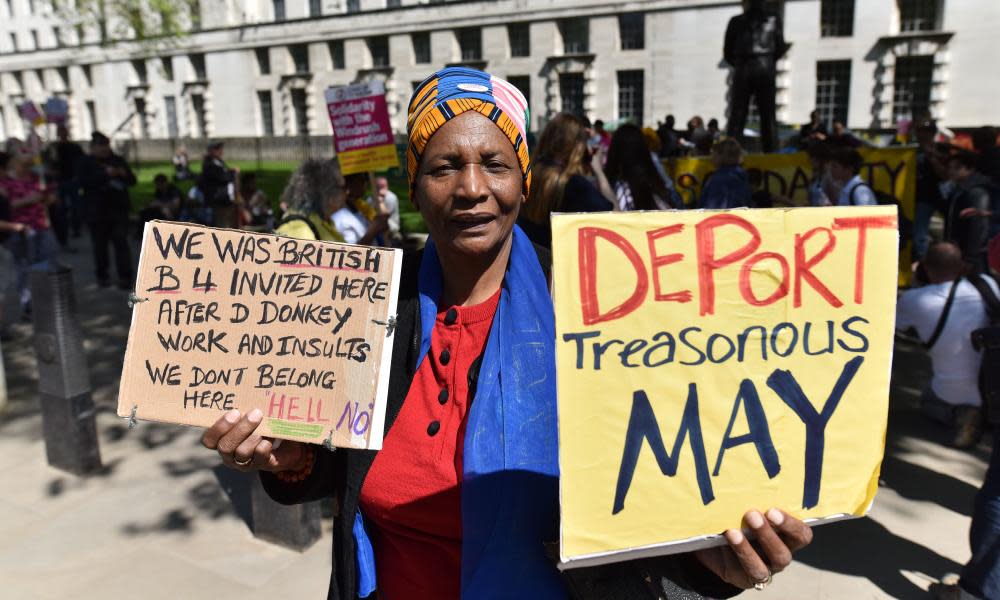A national Windrush Day? Theresa May has some nerve

After years of campaigns for the recognition of the Windrush landing in 1948, the government has announced there will be a national day of celebration every 22 June. Arthur Torrington, of the Windrush Foundation, marked the celebration as a “moment of great satisfaction”, which will etch the migration of people from the colonies into the memory of the nation. But this success is a classic case of being careful what you wish for.
Theresa May has shown herself to be the master of race public relations while working in, and now presiding over, a government whose track record on racism is appalling. As home secretary she made some friends in black communities by raising the issue of racial inequalities in police stop and searches; but never managed to take any action to address the problem. In one of her first speeches as prime minister, she promised to lead a government not “in the interests of the privileged few”, and launched a race-disparity audit that told us nothing we did not already know. Worse still, the discovery of racial inequalities throughout society somehow ended up being packaged as “white working class” boys being victims of “racial injustice”. But the biggest area where May has shown her true colours is on the issue of immigration. As home secretary, she pursued the hostile environment policy, replete with “go-home vans”, deportations and the very immigration checks from the private sector that blew up into the Windrush scandal. More than 5,000 members of the generation we are meant to be celebrating have had their cases lodged with the Home Office, facing detention, deportation and losing their jobs directly because of May’s immigration policy. In response, May appointed the first ever ethnic minority home secretary, Savid Javid: the perfect PR stunt to hide the inherent racism of the government’s immigration policy.
In the same way that we should not have been fooled by that tokenism, neither should we be appeased by a national day to celebrate Windrush. On the issue of racism, May is parading before the public in the emperor’s new clothes, and it should be easy for us to see through her naked cynicism and empty gestures.
Who are the Windrush generation?
They are people who arrived in the UK after the second world war from Caribbean countries at the invitation of the British government. The first group arrived on the ship MV Empire Windrush in June 1948.
What happened to them?
An estimated 50,000 people faced the risk of deportation if they had never formalised their residency status and did not have the required documentation to prove it.
Why now?
It stems from a policy, set out by Theresa May when she was home secretary, to make the UK 'a really hostile environment for illegal immigrants'. It requires employers, NHS staff, private landlords and other bodies to demand evidence of people’s citizenship or immigration status.
Why do they not have the correct paperwork and status?
Some children, often travelling on their parents’ passports, were never formally naturalised and many moved to the UK before the countries in which they were born became independent, so they assumed they were British. In some cases, they did not apply for passports. The Home Office did not keep a record of people entering the country and granted leave to remain, which was conferred on anyone living continuously in the country since before 1 January 1973.
What is the government doing to resolve the problem?
A new Home Office team was set up to ensure Commonwealth-born long-term UK residents would no longer find themselves classified as being in the UK illegally. But a month after one minister promised the cases would be resolved within two weeks, many remain destitute.
The docking of the Windrush was an important historical moment, which deserves to be recognised nationally. As a symbol, it represents a moment when Britain changed forever and the children of the empire reshaped the “motherland”. Without the contributions of that generation, the welfare state could not have been built. The NHS was the heartbeat of the post-war settlement, and even today would crumble without staff from the former colonies.
Struggling through racism and adversity, the Windrush generation challenged public authorities and institutions to at least acknowledge their prejudice. The platform that they created allowed black Britain to thrive both culturally and politically, and the nation simply would not be the same without their endeavour. It is precisely because the contribution of the Windrush generation is so important that we should not allow their labour to be misused as a fig leaf for the government to hide behind to bolster its race-relations image.
It should make us queasy to see this government revel in announcing a day to mark the contributions of the people for whom they have shown no regard. We should be offended that they have the audacity to offer a national day when they have not dealt with the problems facing the people of the Windrush generation. We need to stop accepting token gestures as a substitute for meaningful change. Through austerity, immigration policy and a complete lack of action to address the issues of racism, this government has repeatedly shown it has no interest in reducing inequality. Don’t believe the hype. A national Windrush Day is not progress, it’s just the emperor desperately trying to clothe herself in the illusion of anti-racism.
• Kehinde Andrews is associate professor in sociology at Birmingham City University

 Yahoo News
Yahoo News 
